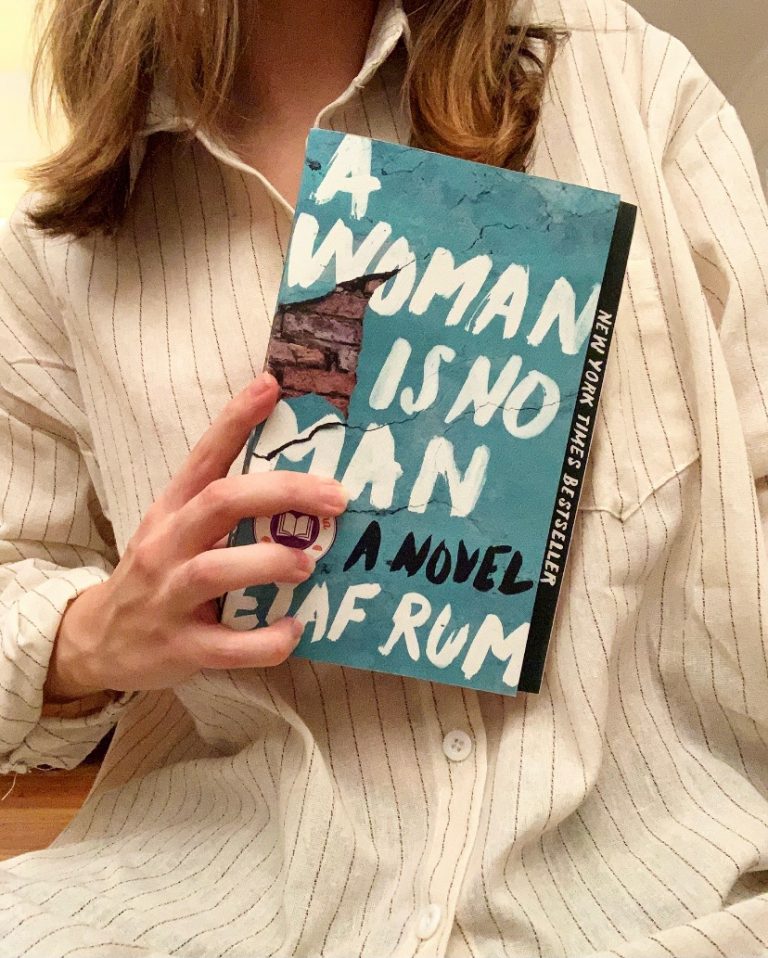“It took more than one woman to do things differently. It took a world of them.”
Etaf Rum, A Woman is No Man
I picked up this book because the title, A Woman Is No Man, intrigued me. Initially, it just sounds like an outdated sentiment, feeling like an echo of the phrase “This is a Man’s World”. But is it really so outdated? Those that don’t understand what feminism means often deny or refuse to acknowledge that sexism still exists. There’s a surprising amount of misinformation which politicizes and makes the term “feminism” a controversial word. In her debut novel, Etaf Rum exposes modern-day sexism by revealing the abuses that occur behind closed doors. This story speaks to a pattern of behavior which is upheld by tradition and gender stereotypes but trickles into the intimate setting of the home. Though you can simply read the statistics to understand why intersectional feminism is important, a great educational tool can be found in fictional stories such as this one. In A Woman is No Man, the female characters are faced with a choice to either suffer in silence or defy their own family if they want to overcome the patriarchal standards that were established long before they were born.
A Woman is No Man begins in beautiful Palestine in 1990 where a young girl named Isra spends her days cooking with her mom, praying, and enjoying the majestic mountains of her homeland. Soon the time comes for her to get married. Her betrothed, Adam, lives in Brooklyn where she will be expected to move. With little say in the matter, Isra is thrust into a new, foreign life. As a girl, she at least had a comfortable home and a country that she loved. With her new family, Isra is shamed and abused. She bears four daughters which heightens the tensions in the household because she was expected to have sons. In Brooklyn in 2008, we meet Deya, Isra’s oldest daughter. Deya lives with her sisters and grandmother in the same Brooklyn home her mother moved to in the ’90s. Desperate to learn about her parents and understand her family’s past, Deya searches the city for answers. The plot shifts back and forth in time from Isra and Deya’s perspectives, slowly exposing the tragic truth of Isra’s marriage.
A Woman is No Man is a moving portrait of the silent trials and tribulations of women living in toxic homes. The characters – Isra, Deya, Fareeda, and Sarah – all feel the weight of the various societal and cultural expectations set on them, but they all respond to them in different ways. The older generation is more inclined to accept the status quo and suffer in silence. Fareeda not only accepts that women should be treated as the lesser gender, but she eventually enforces this standard on the other women in her family. Sarah and Deya are representative of the younger generation. They will not accept the role of an inferior gender. They have greater desires than just being perceived as a “good wife”. I am a huge fan of novels that span more than one generation because you are able to better understand each character, and, in this case, you can see a slow evolution from one generation to the next.
I think it’s important for stories to be a reflection of the author that wrote it. In this case, the author, Etaf Rum, was raised in Brooklyn, and her parents were both Palestinian immigrants. Etaf Rum’s novel succeeds because she is speaking on behalf of her culture and upbringing; I think that gives credence to the message behind the story. One detail that I really appreciated about Rum’s writing is that there are so many quotable excerpts. Her prose is very poignant, and her characters are easy to love and empathize with. In her debut novel, Rum thoughtfully articulates the beauty of the Palestinian culture, the struggles of being uprooted from the homeland, and she exposes a universal, sexist ideology that has subjugated women generation after generation.
A Woman is No Man reminded me of two books that I loved: Erotic Stories for Punjabi Widows by Balli Kaur Jaswal and A Thousand Splendid Suns by Khalid Hosseini. Though these books are written about different cultures, I think there are similarities in the themes and formatting of the novels. In all of these books, there is a distinct divergence in the mindset of the older and younger generations which is indicative of a universal experience. I gave A Woman is No Man a 3.5-star rating. My greatest takeaway from A Woman is No Man is that there is still so much work to be done in the feminist movement to make sure women all over the world are given equitable opportunities and respect, so they can achieve more than merely the role of daughter, wife, and mother.


